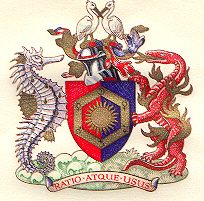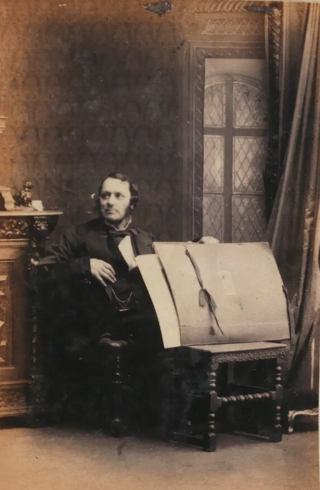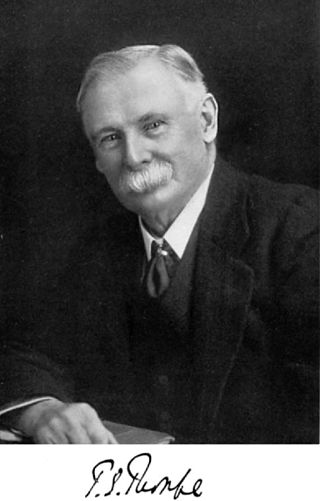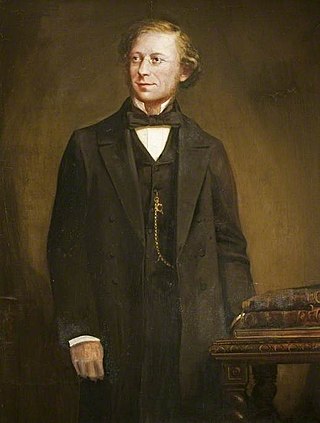Related Research Articles

Sir William Ramsay was a Scottish chemist who discovered the noble gases and received the Nobel Prize in Chemistry in 1904 "in recognition of his services in the discovery of the inert gaseous elements in air" along with his collaborator, John William Strutt, 3rd Baron Rayleigh, who received the Nobel Prize in Physics that same year for their discovery of argon. After the two men identified argon, Ramsay investigated other atmospheric gases. His work in isolating argon, helium, neon, krypton, and xenon led to the development of a new section of the periodic table.

The Royal Society of Chemistry (RSC) is a learned society and professional association in the United Kingdom with the goal of "advancing the chemical sciences". It was formed in 1980 from the amalgamation of the Chemical Society, the Royal Institute of Chemistry, the Faraday Society, and the Society for Analytical Chemistry with a new Royal Charter and the dual role of learned society and professional body. At its inception, the Society had a combined membership of 49,000 in the world.
The Faraday Society was a British society for the study of physical chemistry, founded in 1903 and named in honour of Michael Faraday. In 1980, it merged with several similar organisations, including the Chemical Society, the Royal Institute of Chemistry, and the Society for Analytical Chemistry to form the Royal Society of Chemistry which is both a learned society and a professional body. At that time, the Faraday Division became one of six units within the Royal Society of Chemistry.

The Royal Institute of Chemistry was a British scientific organisation. Founded in 1877 as the Institute of Chemistry of Great Britain and Ireland (ICGBI), its role was to focus on qualifications and the professional status of chemists, and its aim was to ensure that consulting and analytical chemists were properly trained and qualified.
The Chemical Society was a scientific society formed in 1841 by 77 scientists as a result of increased interest in scientific matters. Chemist Robert Warington was the driving force behind its creation.
The Bakerian Medal is one of the premier medals of the Royal Society that recognizes exceptional and outstanding science. It comes with a medal award and a prize lecture. The medalist is required to give a lecture on any topic related to physical sciences. It is awarded annually to individuals in the field of physical sciences, including computer science.

LGC Group, formerly the Laboratory of the Government Chemist, is an international life sciences measurement and tools company. It provides the role and duties of the UK Government Chemist, a statutory adviser to the government. LGC also hosts the UK's National Measurement Laboratory (NML) for chemical and bio-measurement, which performs measurements for diagnostics, advanced therapeutics, safety and security, among others.

George Bowdler Buckton was an English chemist and entomologist who specialised in aphids.

Sir Thomas Edward Thorpe CB, FRS HFRSE LLD was a British chemist. From 1894 to 1909, he was Chief Chemist to the British Government, as Director of the Government Laboratory.

John William Mallet FRS was an Irish chemist who lived and worked in the United States.

John Christopher Augustus Voelcker FRS was a Royal Agricultural Society of England chemist. Voelcker was known for his methodical and precise analytical practices as applied to agricultural chemistry. He began a series of long-term experiments at Woburn on crop rotation and fertilization in 1876. This was continued after his death in 1884 by his son John Augustus Voelcker (1854-1937) who was also an agricultural chemist who headed a committee to investigate improvements to agriculture in India following famines there.

Samuel William Johnson was an American agricultural chemist. He promoted the movement to bring the sciences to the aid of American farmers through agricultural experiment stations and education in agricultural science.
The Tilden Prize is an award that is made by the Royal Society of Chemistry for advances in chemistry. The award was established in 1939 and commemorates Sir William A. Tilden, a prominent British chemist. The prize runs annually with up to three prizes available. Winners receive £5000, a medal and certificate.
The William H. Nichols Medal is awarded annually for original research in chemistry. Nominees must have made a "significant and original contribution in any field of chemistry" during the five years preceding the presentation date. The medallist receives a gold medal, a bronze replica and a cash award. The award was established in 1902 by the New York Section of the American Chemical Society (ACS) through a gift from chemist and businessman William H. Nichols. It was the first award to be approved by the ACS. The medal was first awarded in 1903.
The Society of Chemical Industry (America Section) or SCI America is an independent learned society inspired by the creation of the Society of Chemical Industry (SCI) in London in 1881. Originally known as the New York Section, it was formed in 1894 and officially renamed the America Section in 1919. The main activity of the America Section is the awarding of several prizes in chemistry: the Perkin Medal, the Chemical Industry Medal and the Gordon E. Moore Medal. The America Section also works with the American Chemical Society (ACS) and the American Institute of Chemical Engineers (AIChE) to support underserved and Black scholars in chemistry and chemical engineering.
Robert Tatlock Thomson FRSE FRIC (1856–1950) was a 19th/20th century British chemist and public analyst. In 1908 he was involved in the first legal definition of Scotch whisky.

Ralph Edward Oesper was an American chemist and historian of chemistry. He is noted for his biographies of scientists, emphasizing their personal lives in addition to their scientific contributions. Oesper translated significant works in the field of chemistry to various languages especially English. As an independent investigator, he developed improved analytical methods. These contributions included new reagents for certain types of titrations. One such new reagent, Oesper's Salt, is named after him.
James Emerson Reynolds was an Irish chemist who was the first scientist to isolate thiourea and developed the "Reynolds's test" for acetone.
References
- ↑ Otter, Chris (2020). Diet for a large planet. USA: University of Chicago Press. p. 105. ISBN 978-0-226-69710-9.
- ↑ Wilson, H. N. (1966). An Approach to Chemical Analysis. doi:10.1016/C2013-0-05436-9. ISBN 978-0-08-011543-6.[ page needed ]
- ↑ "Society for Analytical Chemistry Gold Medal". The Analyst. 91 (1081): 223. 1966. Bibcode:1966Ana....91..223.. doi:10.1039/AN9669100223.
- ↑ "RSC Charter and By-laws" (PDF). Retrieved 14 June 2018.